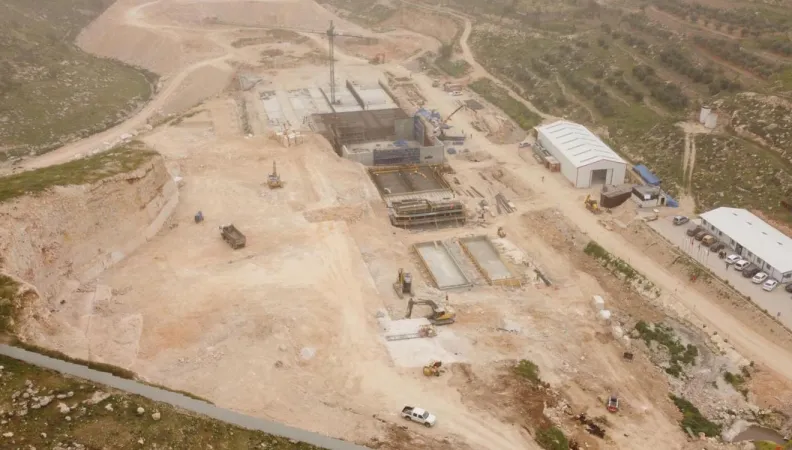Share the page
€36 million from the EU, France, and the World Bank to build the Hebron Regional Waste Water Treatment Plant

Prime Minister Dr. Mohammad Ishtayyeh, the Consul General of France, the EU Representative, and the AFD Country Director together with the Head of the Palestinian Water Authority, Hebron Governor and representatives of the local community laid the corner stone for the Hebron Regional Waste Water Treatment Plant in Hebron. At completion, the plant will serve around 400,000 people living in Hebron City and along Wadi As-Samen in Hebron Governorate and will pave the way to treated water reuse for agricultural purpose.
Sewage from the Hebron Governorate runs untreated through populated areas (Wadi As-Samen) causing a substantial damage to the aquifer and the health of the residents. Safeguarding water and the environment is key towards sustainable development and ensuring a better future for all Palestinians. The Hebron Regional Wastewater Management Project is developing a treatment plant and will support the Hebron Municipality in the development of an independent water and wastewater service. The project addresses the immediate needs for treatment of the existing sewage stream coming from 80% of Hebron city. The Wastewater Treatment Plant will treat the sewage flow in Wadi As-Samen. The project will reduce environmental pollution and health risks from wastewater produced in the Hebron Municipality.
“Today’s ceremony concretize a new and important milestone: Hebron sewerage project is now on track. The path is traced for the full impacts to be met: social impacts, financial impacts (at PA’s level), economic, including treated wastewater reuse for agricultural purpose, and environmental impacts. At the end of this road, there is a significant improvement for quality of life of Hebron Governorate population. All stakeholders should keep this momentum!”, added the Consul General of France in Jerusalem, René Troccaz.
"In a context of harsh water scarcity, now exacerbated by climate change, it is important for Palestinians to treat wastewater and use it to address the water shortage. This Project is the single biggest project in the West Bank and is located at the largest Palestinian governorate. Besides providing an alternative source of water, the project aims to improve health and hygiene conditions and help develop agricultural land," said the EU Representative, Sven Kühn von Burgsdorff at the cornerstone ceremony. "Hebron governorate which is known as the second largest area of agricultural land. Farmers will be able to use the treated water to develop their land and expand cultivated areas. This will increase their income and contribute directly to the economic development in the governorate," added the EU Representative.
“The Palestinians cope with one of the lowest levels of per capita water resource availability in the region. This project is a model of collaboration between donor partners to treat wastewater pollution and increase water availability to Palestinian communities. We are proud to be engaged in the process and look forward to building sustainable wastewater management capacity”, said Kanthan Shankar, Country Director for West Bank and Gaza.
The €55 million project is co-financed by the EU (15 M€), AFD (17.5 M€), the World Bank (4.5 M$), the Palestinian Authority and Hebron Municipality. The project consists of Wastewater Treatment Infrastructure with a capacity to treat 22,500 cubic meters daily. The project will entail capacity building for sustainable management, operation and maintenance of Hebron Regional Wastewater Treatment Plant, and support project management, monitoring, evaluation, and studies.
Background:
The EU proactively protects the water and environment in Palestine. Currently, the EU has ongoing projects totalling € 135 million in the water and sanitation sector, excluding the Gaza Central Desalination Plant Pledge. In the West Bank, apart from Hebron, the EU is supporting the development of wastewater treatment plants in particular areas where water supply is scarce, such as Tubas and Nablus. In Gaza, the EU is investing in large-scale solid waste management programmes as well as in taking the lead in funding the Gaza Central Desalination Plant with an investment up to €150 million over the coming 5 years, which will provide safe drinking water to around 2,000,000 Palestinians in the long term.
AFD's core intervention in Palestine has been in the Water and sanitation sector for more than twenty years. Fifteen water and sanitation projects have been supported in the West bank and Gaza Strip for a total amount of € 140 million. AFD has also mobilized and managed additional € 70 million of delegated financings, from EU, the Netherlands and Green Climate Fund. These projects have enabled nearly 1 million people to gain access to drinking water or to benefit from a significant improvement in the quality of the drinking water and sanitation services. AFD funded projects also aim at capacity building, within public institutions and at utility level, as well as supporting implementation of the 2014 Water Law.
The World Bank has played a key donor’s coordination role to mobilize a substantial grant funding to the water sector in West Bank and Gaza over the past 25 years. It has also contributed to the analytical work that has been helpful for underpinning the policy and investment decisions about water resources and water services. Currently, the Bank manages a portfolio of around $135 of investments in the water sector that are geared towards building critical infrastructure for water supply and wastewater treatment as well as supporting capacity building of water sector institutions at the national and local levels.
